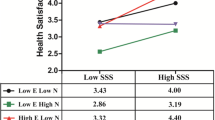Abstract
This study explored associations of life satisfaction with personality traits, life events, and social support among 187 Chinese gay men in Hong Kong. In general, participants were modestly satisfied with various aspects of their lives. Findings from a hierarchical regression analysis indicated that a high level of life satisfaction of Chinese gay men was related to weak borderline personality traits, disclosure of homosexual sexual orientation, and gay peer support. Results also showed that there was no interaction effect between personality and psychosocial variables in affecting life satisfaction. Limitations and implications of this study were also discussed.
Similar content being viewed by others
REFERENCES
Andrews, F.M. and S.B. Withey: 1976, Social Indicators of Well-being: America's Perception of Life Quality (Plenum Press, New York).
Cheng, H. and A. Furnham: 2001, ‘Attributional style and personality as predictors of happiness and mental health’, Journal of Happiness Studies 2, pp. 307-327.
Cole, S., M. Kemeny, S. Taylor and B.R. Visscher: 1996, ‘Elevated physical health risk among gay men who conceal their homosexual identity’, Health Psychology 15, pp. 243-251.
D'Augelli, A.R., N.W. Pilkington and S.L. Hershberger: 2002, ‘Incidence and mental health impact of sexual orientation of lesbians, gay, and bisexual youths in high school’, School Psychology Quarterly 17, pp. 148-167.
DeNeve, K.M. and H. Cooper: 1998, ‘The happy personality: A meta-analysis of 137 personality traits and subjective well-being’, Psychological Bulletin 124, pp. 197-229.
Diener, E.: 1996, ‘Traits can be powerful, but are not enough: Lessons from subjective well-being’, Journal of Research in Personality 30, pp. 389-399.
Diener, E., R.A. Emmons, R.J. Larsen and S. Griffin: 1985, ‘The satisfaction with life scale’, Journal of Personality Assessment 49, pp. 71-75.
Diener, E. and R.E. Lucas: 1999, ‘Personality and subjective well-being’, in D. Kahneman, E. Diener and N. Schwarz (eds.), Well-being: The Foundations of Hedonic Psychology (Russell Sage Foundation, New York), pp. 213-229.
Diener, E., E. Suh and S. Oishi: 1997, ‘Recent findings on subjective well-being’, Indian Journal of Clinical Psychology 24, pp. 25-41.
Furnham, A. and H. Cheng: 2000, ‘Perceived parental behavior, self-esteem, and happiness', Social Psychiatry and Psychiatric Epidemiology 35, pp. 463-470.
Headey, B. and A. Wearing: 1989, ‘Personality, life events, and subjective wellbeing: Toward a dynamic equilibrium model’, Journal of Personality and Social Psychology 57, pp. 731-739.
Kwan, V.S.Y., M.H. Bond and T.M. Singelis: 1997, ‘Pancultural explanations for life satisfaction: Adding relationship harmony to self-esteem’, Journal of Personality and Social Psychology 73, pp. 1038-1051.
Landolt, M. and D. Dutton: 1997, ‘Power and personality: An analysis of gay male intimate abuse’, Sex Roles 37, pp. 335-359.
Lock, J. and S. Hans: 1999, ‘Gay, lesbian, and bisexual youth risks for emotional, physical, and social problems: Results from a community-based survey’, Journal of the American Academy of Child and Adolescent Psychiatry 38, pp. 297-304.
Lu, L.: 1999, ‘Personal or environmental causes of happiness: A longitudinal analysis', Journal of Social Psychology 139, pp. 79-90.
Lu, L., J.B. Shih, Y.Y. Lin and L.S. Ju: 1997, ‘Personal and environmental correlates of happiness', Personality and Individual Differences 23, pp. 453-462.
McKirnan, D.J., J.P. Stokes, L.S. Doll and R.G. Burzette: 1995, ‘Bisexually active men: Social characteristics and sexual behavior’, Journal of Sex Research 32, pp. 64-75.
Myers, D.G.: 1999, ‘Close relationships and quality of life’, in D. Kahneman, E. Diener and N. Schwarz (eds.), Well-being: The Foundations of Hedonic Psychology (Russell Sage Foundation, New York), pp. 213-229.
Oldham, J., J. Clarkin, A. Appelbaum, A. Carr, P. Kernberg, A. Lotterman and G. Haas: 1985, ‘A self-report instrument for Borderline Personality Organization’, in T.H. McGlashan (ed.), The Borderline: Current Empirical Research. The Progress in Psychiatry Series (American Psychiatric Press, Washington, D.C.), pp. 1-18.
Ormel, J. and W. Schaufeli: 1991, ‘Stability and change in psychological distress and their relationship with self-esteem and locus of control: A dynamic equilibrium model’, Journal of Personality and Social Psychology 60, pp. 288-299.
Rosario, M., J. Hunter, S. Magnew, M. Gwadz and R. Smith: 2001, ‘The coming-out process and its adaptational and health-related associations among gay, lesbians, and bisexual youths: Stipulation and exploration of a model’, American Journal of Community Psychology 29, pp. 133-160.
Rosario, M., E. Schrimshaw, J. Hunter and M. Gwadz: 2002, ‘Gay-related stress and emotional distress among gay, lesbian and bisexual youths: A longitudinal examination’, Journal of Consulting and Clinical Psychology 70, pp. 967-975.
Savin-Williams, R.C.: 1990, Gay and Lesbian Youth: Expressions of Identity (Hemisphere Publishing Corporation, New York).
Silverstein, C.: 1988, ‘The borderline personality disorder and homosexual people’, Journal of Homosexuality 15, pp. 185-211.
Tang, C., F. Lai and T. Chung: 1997, ‘Assessment of sexual functioning for Chinese college students', Archives of Sexual Behavior 26, pp. 79-90.
Vanable, P.A., D.J. McKirnan and J.P. Stokes: 1998, ‘Identification and involvement with the gay community scale’, in C.M. Davis, W.L. Yarber, R. Bauserman, G. Schreer and S.L. Davis (eds.), Handbook of Sexuality-related Measures (Sage Publications Inc., California), pp. 407-409.
Weinberg, M.S. and C.J. Williams: 1974, Male Homosexuals: Their Problems and Adaptations (Penguin, New York).
Author information
Authors and Affiliations
Rights and permissions
About this article
Cite this article
Wong, CY., So-Kum Tang, C. Personality, Psychosocial Variables, and Life Satisfaction of Chinese Gay Men in Hong Kong. Journal of Happiness Studies 4, 285–293 (2003). https://doi.org/10.1023/A:1026211323099
Issue Date:
DOI: https://doi.org/10.1023/A:1026211323099



